八年级下Module 3 Journey to space Unit 3 Language in use 课件(21张PPT)
文档属性
| 名称 | 八年级下Module 3 Journey to space Unit 3 Language in use 课件(21张PPT) |
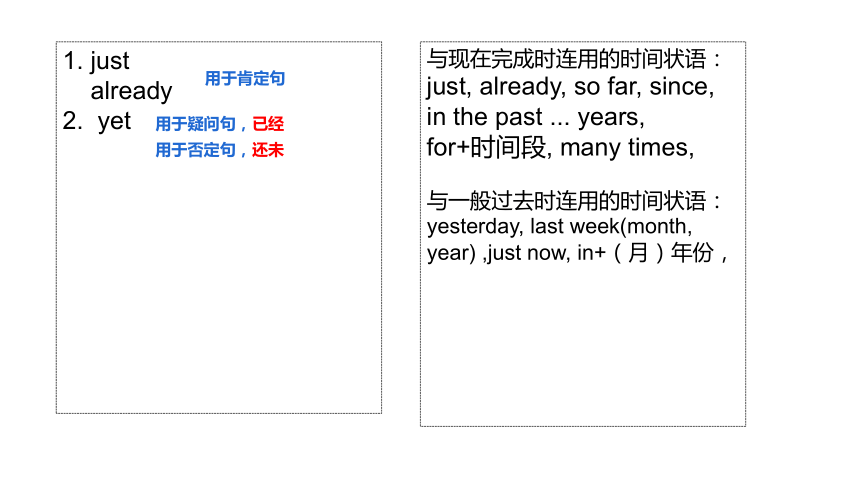
|
|
| 格式 | pptx | ||
| 文件大小 | 2.7MB | ||
| 资源类型 | 教案 | ||
| 版本资源 | 外研版 | ||
| 科目 | 英语 | ||
| 更新时间 | 2022-08-06 00:00:00 | ||
图片预览

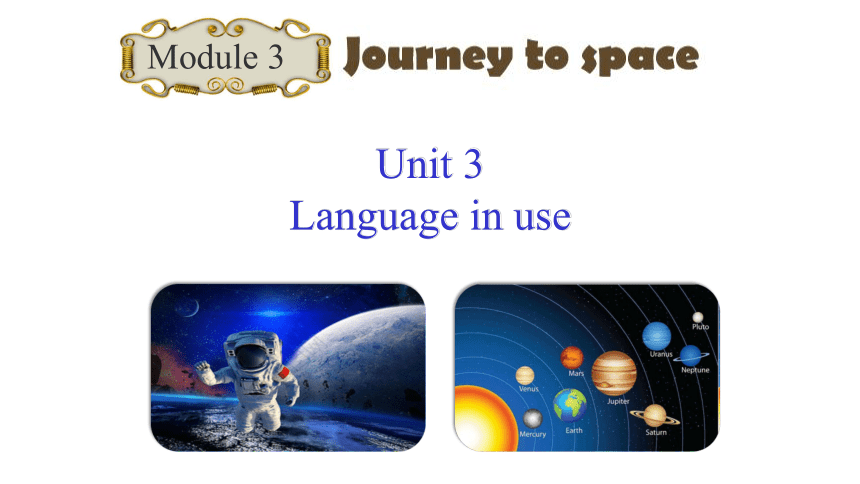
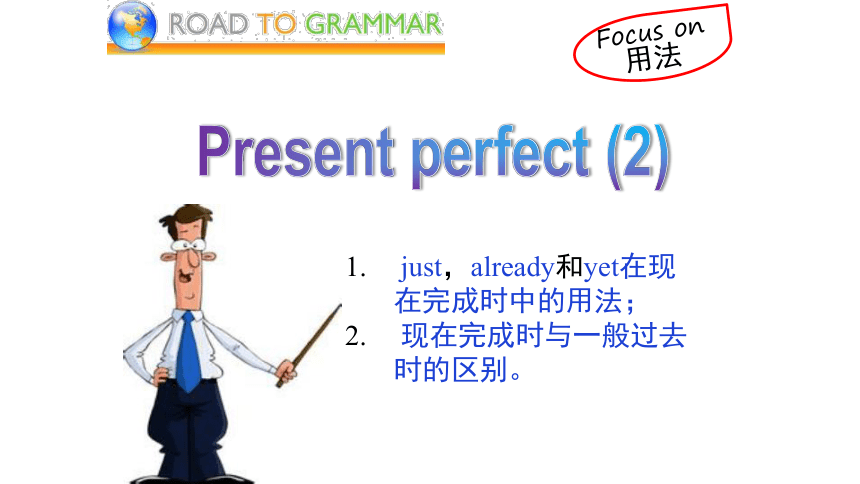
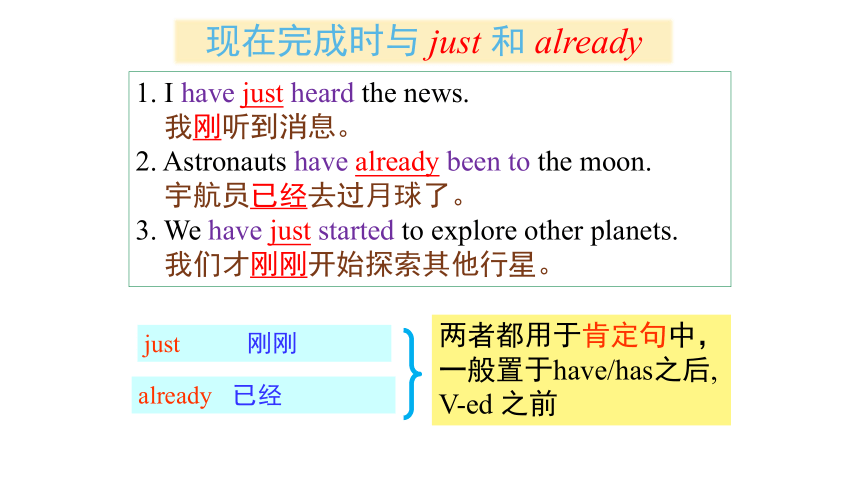
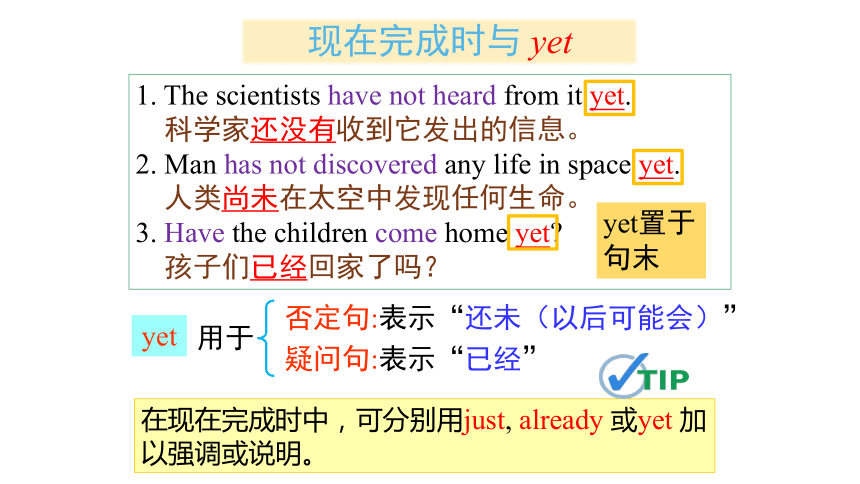
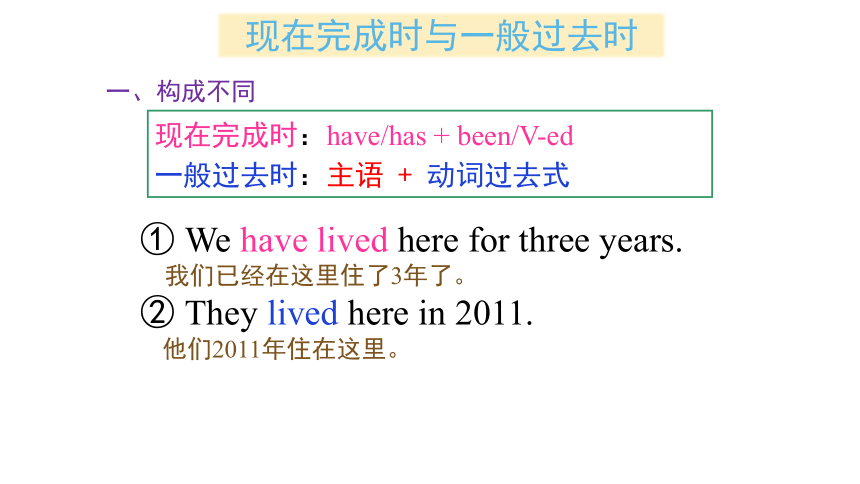
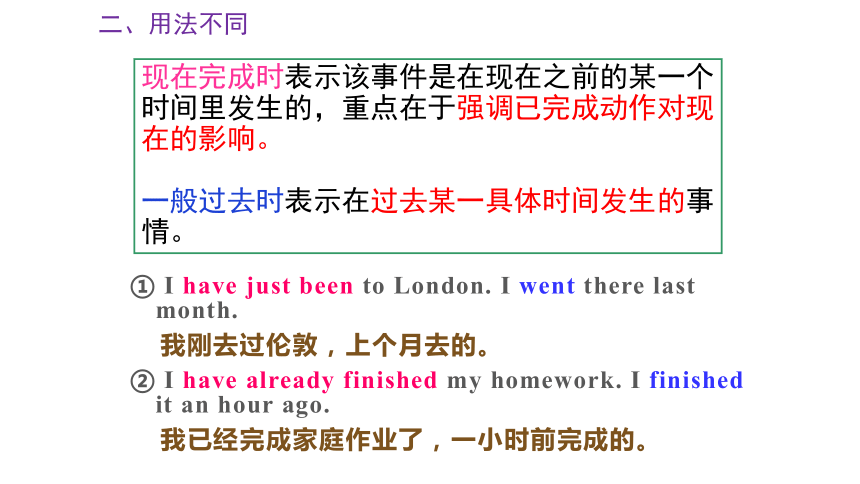
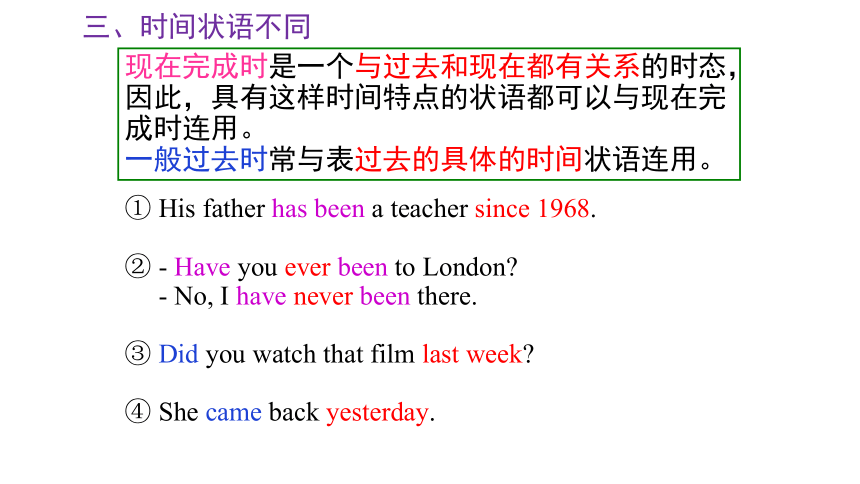
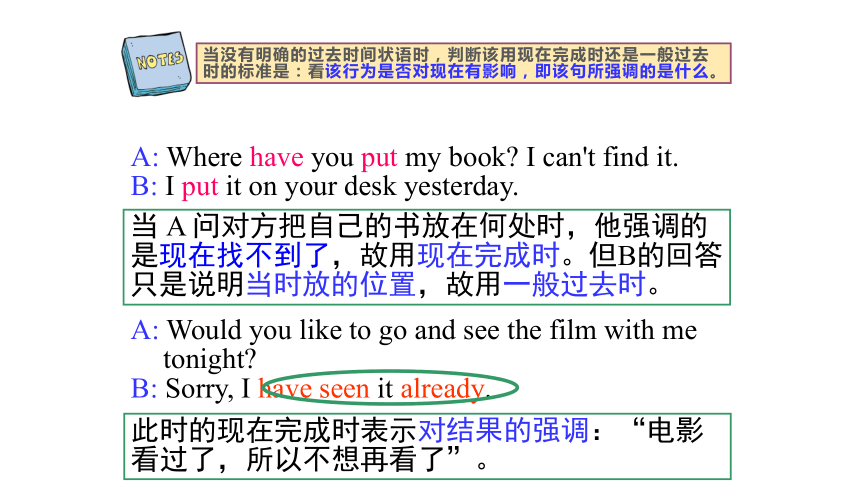
文档简介
(共21张PPT)
1. just
already
2. yet
用于肯定句
用于疑问句,已经
用于否定句,还未
与现在完成时连用的时间状语:
just, already, so far, since, in the past ... years,
for+时间段, many times,
与一般过去时连用的时间状语:
yesterday, last week(month, year) ,just now, in+(月)年份,
Module 3
Unit 3
Language in use
Present perfect (2)
Focus on
用法
just,already和yet在现在完成时中的用法;
现在完成时与一般过去时的区别。
1. I have just heard the news.
我刚听到消息。
2. Astronauts have already been to the moon.
宇航员已经去过月球了。
3. We have just started to explore other planets.
我们才刚刚开始探索其他行星。
两者都用于肯定句中,一般置于have/has之后, V-ed 之前
just 刚刚
already 已经
现在完成时与 just 和 already
1. The scientists have not heard from it yet.
科学家还没有收到它发出的信息。
2. Man has not discovered any life in space yet.
人类尚未在太空中发现任何生命。
3. Have the children come home yet
孩子们已经回家了吗?
yet置于句末
yet
用于
否定句:表示“还未(以后可能会)”
疑问句:表示“已经”
现在完成时与 yet
在现在完成时中,可分别用just, already 或yet 加以强调或说明。
现在完成时:have/has + been/V-ed
一般过去时:主语 + 动词过去式
① We have lived here for three years.
我们已经在这里住了3年了。
② They lived here in 2011.
他们2011年住在这里。
现在完成时与一般过去时
一、构成不同
① I have just been to London. I went there last month.
我刚去过伦敦,上个月去的。
② I have already finished my homework. I finished it an hour ago.
我已经完成家庭作业了,一小时前完成的。
现在完成时表示该事件是在现在之前的某一个时间里发生的,重点在于强调已完成动作对现在的影响。
一般过去时表示在过去某一具体时间发生的事情。
二、用法不同
现在完成时是一个与过去和现在都有关系的时态,因此,具有这样时间特点的状语都可以与现在完成时连用。
一般过去时常与表过去的具体的时间状语连用。
① His father has been a teacher since 1968.
② - Have you ever been to London
- No, I have never been there.
③ Did you watch that film last week
④ She came back yesterday.
三、时间状语不同
当 A 问对方把自己的书放在何处时,他强调的是现在找不到了,故用现在完成时。但B的回答只是说明当时放的位置,故用一般过去时。
A: Where have you put my book I can't find it.
B: I put it on your desk yesterday.
当没有明确的过去时间状语时,判断该用现在完成时还是一般过去时的标准是:看该行为是否对现在有影响,即该句所强调的是什么。
A: Would you like to go and see the film with me tonight
B: Sorry, I have seen it already.
此时的现在完成时表示对结果的强调:“电影看过了,所以不想再看了”。
用一般过去时或现在完成时填空。
1. Nobody can find my treasures(财富) because I __________
(hide) them in a secret place.
2. — Rob, shall we go to the cinema tonight
— I‘d love to, but Tim _________ (invite)me out for dinner tonight.
3. —_____ you _____ (talk)about it with your father, Tom
— Yes, I have.
4. We __________ (learn) many new words since then.
Exercises
have hidden
has invited
Have talked
have learned
Astronauts have (1) _______ been to the moon but they have not been to any other planets. However, a spaceship has (2) _____ arrived on Mars and it has (3) ______ sent back photos of the red planet. Is there life on Mars We do not know (4) ______.
already
just
already
yet
Complete the news with already, just and yet.
Spaceship on Mars!
P22
1
The spaceship has gone to Mars.
It has gone there, but it has not come back yet.
(去了某地,现在还没回来)
Astronauts have been to the moon.
They went there and then they came back.
(去过某地,现已回来)
Look at these sentences.
P22
2
Now choose the correct answer.
Astronauts have been / gone to the moon and returned.
The spaceship has been / gone into space. It will travel for ten days.
The astronaut has been / gone to the space station. He will come back tomorrow.
The spaceship has been / gone to the space station. It brought back two astronauts.
1. A spaceship ________ to Mars. It is coming back to the earth next year.
2. Lots of astronauts ________ to the space station. They found it very interesting.
3. Some astronauts _________ to the moon twice.
4. Two British astronauts __________ to the space station. They will come back in January.
has gone
have been
have been
have gone
Complete the sentences with the expressions in the box.
P23
3
have/has been have/has gone
Nicky: I've just (1) _______ (watch) a great
TV programme about space. Did you
know that scientists have (2) ________
(discover) water on Mars
Bill: Yes, I did. And scientists (3) ________
(try) to find life on Mars now.
Nicky: Yes, they're looking for life but they
(4) ____________ (not find) anything yet.
Bill: There were some new photos of Mars
in the newspaper today. (5) ______
you _____ (see) them yet
Nicky: Yes. They're amazing!
haven't found
seen
Have
watched
discovered
are trying
Complete the conversation with the correct form of the verbs in brackets.
Work in pairs. Role-play the conversation.
P23
4
Complete the email with the words in the box.
been just met never read written yet
read
been
never
met
written
yet
just
P23
6
1. The astronaut joined CNSA _______ years ago.
2. He has flown in a spaceship ______ times.
3. He felt ______ when he was in the spaceship.
4. He has been to the space station _______.
5. The earth was blue and very ________ when he saw it from the space station.
6. He decided to be an astronaut because he has always been ____________ in space.
beautiful
interested
Listen and complete the notes.
six
two
excited
twice
P24
7
Complete the word map with the words and expressions in the box.
astronaut Mars spaceship space station the earth the moon the sun
SPACE
space travel
solar system
spaceship
astronaut
space station
Mars
the sun
the earth
the moon
Now add more words about space to the word map and write five sentences.
P24
8
Possible sentences for reference:
1. We've just read a story about a space station near the sun.
2. Astronauts haven't been to the sun, because it's too hot.
3. Spaceships are travelling in our solar system at the moment.
4. I am interested in space and the stars and planets in our galaxy.
5. I think scientists will send astronauts to Mars one day.
In July 1969, Neil Armstrong became the first (1)__________ to walk on the (2)_______. People all around the world watched their televisions and waited for the (3)_______ to (4)_______ the earth. We have now (5)_________ a lot more about our solar system, and we have sent (6)_________ to Mars, but no one has walked on that planet (7) _______. But I believe one day someone will!
news
reach
discovered
spaceships
yet
astronaut discover moon news reach spaceship yet
astronaut
moon
Complete the passage with the correct form of the words in the box.
P25
9
1. Finish the exercises in 《教与学》、《优加》.
2. Preview the new words and expressions in Module 4.
1. just
already
2. yet
用于肯定句
用于疑问句,已经
用于否定句,还未
与现在完成时连用的时间状语:
just, already, so far, since, in the past ... years,
for+时间段, many times,
与一般过去时连用的时间状语:
yesterday, last week(month, year) ,just now, in+(月)年份,
Module 3
Unit 3
Language in use
Present perfect (2)
Focus on
用法
just,already和yet在现在完成时中的用法;
现在完成时与一般过去时的区别。
1. I have just heard the news.
我刚听到消息。
2. Astronauts have already been to the moon.
宇航员已经去过月球了。
3. We have just started to explore other planets.
我们才刚刚开始探索其他行星。
两者都用于肯定句中,一般置于have/has之后, V-ed 之前
just 刚刚
already 已经
现在完成时与 just 和 already
1. The scientists have not heard from it yet.
科学家还没有收到它发出的信息。
2. Man has not discovered any life in space yet.
人类尚未在太空中发现任何生命。
3. Have the children come home yet
孩子们已经回家了吗?
yet置于句末
yet
用于
否定句:表示“还未(以后可能会)”
疑问句:表示“已经”
现在完成时与 yet
在现在完成时中,可分别用just, already 或yet 加以强调或说明。
现在完成时:have/has + been/V-ed
一般过去时:主语 + 动词过去式
① We have lived here for three years.
我们已经在这里住了3年了。
② They lived here in 2011.
他们2011年住在这里。
现在完成时与一般过去时
一、构成不同
① I have just been to London. I went there last month.
我刚去过伦敦,上个月去的。
② I have already finished my homework. I finished it an hour ago.
我已经完成家庭作业了,一小时前完成的。
现在完成时表示该事件是在现在之前的某一个时间里发生的,重点在于强调已完成动作对现在的影响。
一般过去时表示在过去某一具体时间发生的事情。
二、用法不同
现在完成时是一个与过去和现在都有关系的时态,因此,具有这样时间特点的状语都可以与现在完成时连用。
一般过去时常与表过去的具体的时间状语连用。
① His father has been a teacher since 1968.
② - Have you ever been to London
- No, I have never been there.
③ Did you watch that film last week
④ She came back yesterday.
三、时间状语不同
当 A 问对方把自己的书放在何处时,他强调的是现在找不到了,故用现在完成时。但B的回答只是说明当时放的位置,故用一般过去时。
A: Where have you put my book I can't find it.
B: I put it on your desk yesterday.
当没有明确的过去时间状语时,判断该用现在完成时还是一般过去时的标准是:看该行为是否对现在有影响,即该句所强调的是什么。
A: Would you like to go and see the film with me tonight
B: Sorry, I have seen it already.
此时的现在完成时表示对结果的强调:“电影看过了,所以不想再看了”。
用一般过去时或现在完成时填空。
1. Nobody can find my treasures(财富) because I __________
(hide) them in a secret place.
2. — Rob, shall we go to the cinema tonight
— I‘d love to, but Tim _________ (invite)me out for dinner tonight.
3. —_____ you _____ (talk)about it with your father, Tom
— Yes, I have.
4. We __________ (learn) many new words since then.
Exercises
have hidden
has invited
Have talked
have learned
Astronauts have (1) _______ been to the moon but they have not been to any other planets. However, a spaceship has (2) _____ arrived on Mars and it has (3) ______ sent back photos of the red planet. Is there life on Mars We do not know (4) ______.
already
just
already
yet
Complete the news with already, just and yet.
Spaceship on Mars!
P22
1
The spaceship has gone to Mars.
It has gone there, but it has not come back yet.
(去了某地,现在还没回来)
Astronauts have been to the moon.
They went there and then they came back.
(去过某地,现已回来)
Look at these sentences.
P22
2
Now choose the correct answer.
Astronauts have been / gone to the moon and returned.
The spaceship has been / gone into space. It will travel for ten days.
The astronaut has been / gone to the space station. He will come back tomorrow.
The spaceship has been / gone to the space station. It brought back two astronauts.
1. A spaceship ________ to Mars. It is coming back to the earth next year.
2. Lots of astronauts ________ to the space station. They found it very interesting.
3. Some astronauts _________ to the moon twice.
4. Two British astronauts __________ to the space station. They will come back in January.
has gone
have been
have been
have gone
Complete the sentences with the expressions in the box.
P23
3
have/has been have/has gone
Nicky: I've just (1) _______ (watch) a great
TV programme about space. Did you
know that scientists have (2) ________
(discover) water on Mars
Bill: Yes, I did. And scientists (3) ________
(try) to find life on Mars now.
Nicky: Yes, they're looking for life but they
(4) ____________ (not find) anything yet.
Bill: There were some new photos of Mars
in the newspaper today. (5) ______
you _____ (see) them yet
Nicky: Yes. They're amazing!
haven't found
seen
Have
watched
discovered
are trying
Complete the conversation with the correct form of the verbs in brackets.
Work in pairs. Role-play the conversation.
P23
4
Complete the email with the words in the box.
been just met never read written yet
read
been
never
met
written
yet
just
P23
6
1. The astronaut joined CNSA _______ years ago.
2. He has flown in a spaceship ______ times.
3. He felt ______ when he was in the spaceship.
4. He has been to the space station _______.
5. The earth was blue and very ________ when he saw it from the space station.
6. He decided to be an astronaut because he has always been ____________ in space.
beautiful
interested
Listen and complete the notes.
six
two
excited
twice
P24
7
Complete the word map with the words and expressions in the box.
astronaut Mars spaceship space station the earth the moon the sun
SPACE
space travel
solar system
spaceship
astronaut
space station
Mars
the sun
the earth
the moon
Now add more words about space to the word map and write five sentences.
P24
8
Possible sentences for reference:
1. We've just read a story about a space station near the sun.
2. Astronauts haven't been to the sun, because it's too hot.
3. Spaceships are travelling in our solar system at the moment.
4. I am interested in space and the stars and planets in our galaxy.
5. I think scientists will send astronauts to Mars one day.
In July 1969, Neil Armstrong became the first (1)__________ to walk on the (2)_______. People all around the world watched their televisions and waited for the (3)_______ to (4)_______ the earth. We have now (5)_________ a lot more about our solar system, and we have sent (6)_________ to Mars, but no one has walked on that planet (7) _______. But I believe one day someone will!
news
reach
discovered
spaceships
yet
astronaut discover moon news reach spaceship yet
astronaut
moon
Complete the passage with the correct form of the words in the box.
P25
9
1. Finish the exercises in 《教与学》、《优加》.
2. Preview the new words and expressions in Module 4.
同课章节目录
- Module 1 Feelings and impressions
- Unit 1 It smells delicious.
- Unit 2 I feel nervous when I speak Chinese .
- Unit 3 Language in use
- Module 2 Experiences
- Unit 1 I've also entered lots of speaking competi
- Unit 2 They have seen the Pyramids.
- Unit 3 Language in use
- Module 3 Journey to space
- Unit 1 Has it arrived yet?
- Unit 2 We have not found life on any other planet
- Unit 3 Language in use
- Module 4 Seeing the docto
- Unit 1 I haven't done much exercise since I got m
- Unit 2 We have played football for a year now
- Unit 3 Language in use
- Module 5 Cartoons
- Unit 1 It's time to watch a cartoon.
- Unit 2 Tintin has been popular for over eighty yea
- Unit 3 Language in use
- Revision module A
- Module 6 Hobbies
- Unit 1 Do you collect anything ?
- Unit 2 Hobbies can make you grow as a person.
- Unit 3 Language in use
- Module 7 Summer in Los Angeles
- Unit 1 Please write to me and send me some photos
- Unit 2 Fill out a form and come to learn English
- Unit 3 Language in use
- Module 8 Time off
- Unit 1 I can hardly believe we are in the city ce
- Unit 2 We thought somebody was moving about
- Unit 3 Language in use
- Module 9 Friendship
- Unit 1 Could I ask if you've mentioned this to he
- Unit 2 I believe that the world is what you think
- Unit 3 Language in use
- Module 10 On the radio
- Unit 1 I hope that you can join us one day
- Unit 2 It seemed that they were speaking to me in
- Unit 3 Language in use
- Revision module B
